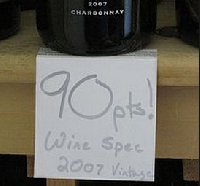
Know what wine ratings mean when you are considering your next expensive bottle
For the love of vino and all the bottles that you may be persuaded to buy or pass on based on them, let?s take a close look at what wine ratings really mean. Even if you don?t read the magazines and websites, you likely see ratings posted below bottles on the shelves of wine stores.
You see a score for a bottle you?ve never tried before and it?s within your budget. It scored in the 90s, which on a scale of 50-100 is encouraging, but where does this number come from and what is it trying to tell you? Fortunately, you don?t need to be an expert yourself to crack this code and discover great wines.
Where scores come from
Wine publications each put out their own ratings. Within each publication is a team of experts each focused on a specific wine-producing region. Tastings are ?blind? so the experts aren?t influenced by name recognition. Sometimes they?re conducted by a panel while other times one critic has final say on the scoring.
~
Well known wine publications include Wine Spectator, The Wine Advocate and Wine Enthusiast. The scoring system and point system varies within each outlet, but basically the critics score wines in order to clearly communicate a wine?s quality to as many consumers as possible.
Wine sometimes has an intimidating reputation, but the scoring systems are for the masses ? for those who just want to know if they should try an unfamiliar name or not. Critics do their best to help you decide based on how a vintage will taste at its peak.
The point systems
To know what wine ratings mean, simply take a look at the point scales. The 50-100 scale is most commonly used in the United States. Most wines fall within the 85-100 range and any score above 95 indicates an excellent bottle. Those between 75 and 80 have minor flaws and a score of less than 75 is not recommended.
The 20-point system is more academic in nature and less commonly seen in stores. It awards points for specific characteristics including aroma, color and the balance of tannins and acids. Scores of 16 and over are superior while those of 15 and under range from average to dull and blatantly flawed.
Everyone loves a classic 5-starred rating. Only a handful of critics and awards use this basic system where 5 stars indicate high quality and 3 reflect a solid wine for everyday enjoyment.
To buy or not to buy
As you may have guessed, rating wine is subjective however qualified the experts. If their tastes don?t reflect your own, these numbers are no guarantee of what you will and won?t enjoy.
Paying attention to high scores could help you discover a few new favorites just don?t break your budget to do it. A high score says that a highly qualified critic or panel of them was impressed by the flavors, balance, aroma and other telling qualities of the variety. A high score doesn?t directly say you will love it, but at least you know it won?t fall apart or taste funny.
It bears repeating that the purpose of the scoring is to help consumers find wines they?ll love. Unless you read the scoring publications, you?ll probably only hear about wines that received the highest scores. The simple reason is that posting which wines received the lowest scores won?t help stores sell those bottles.
If you?re interested in developing more in depth knowledge of what wine ratings mean and learning to describe it, take note of which scoring publications you agree with. Start a basic journal to save labels and keep your own notes. To stay updated on new producers in the industry and notably good vintages, sign up for newsletters.
Don?t be afraid to try something new, especially when an expert gives an enthusiastic bottoms-up.

